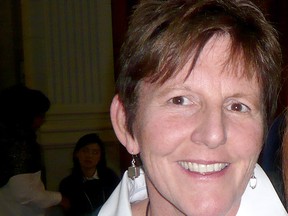
A former Chatham woman has received national acclaim for her role in guiding the paradigm shift in understanding how victims of trauma and abuse share their experiences.
Lori Haskell, who was raised in Chatham, was named a member of the Order of Canada in December for her “groundbreaking and transformational research into the treatment of violence and trauma in vast sectors of society.”
Through extensive research and her practice as a clinical psychologist, Haskell said she’s been able to integrate a deeper understanding of trauma with her interest in teaching and consulting.
She does a lot of work with police services and the legal system, including Crown attorneys and judges. Haskell has conducted 134 training sessions with police departments, including municipal services, the RCMP and military police.
“I think delayed disclosure was one of the first obstacles to overcome,” Haskell said in changing how abuse and trauma victims were viewed. “I feel like there’s judicial notice of it now and that doesn’t often create an obstacle.”
In the past, questions would often be raised as to why it would sometimes take a victim five or 10 years to come forward, she said.
“There’s such a complex range of responses, and I think it’s so easy to sit back and think, ‘I would have done this’ or ‘I would have said this’.”
When working with police, Haskell said she often hears questions about why the victim didn’t pick up the phone and call 911.
She said police repeatedly train “to make something a habit, to make it an automatic response, because they know in moments of stress and threat parts of their brain become inhibited … and decision-making is altered.”
She tells people that “this is new science” during her presentations.
“It’s a paradigm shift,” she said. “It changes how all of us understand these complex responses.”
Haskell said conducting these presentations has been “enormously rewarding,” especially since she’s often asked to come back.
Haskell has helped police officers understand memory and how to interview in a way that doesn’t “put people under threat, but help people discuss what actually happened.”
She hears from police how they’ve changed the way they’re working with victims of trauma and abuse by interviewing them differently.
Haskell said a 30-year veteran police detective shared how he was having little success interviewing a female assault victim until he remembered the psychologist’s presentation.
He told her: “I remembered what you said about how memory works … and how trauma is remembered by people, and I did what you said.”
Looking to the future, she said the research is becoming “much more complex in terms of what we’re learning about how the brain processes” and “how traumatic memories are encoded.”
The research, she added, can examine how to help people feel safe and connected so they can actually form a narrative about these often horrifying experiences.
“My job is to actually translate that science and make it relevant,” Haskell said.
Most front-line workers, she said, are not going to have time to read complex articles on this subject and try to understand how it’s relevant to their job.
Haskell said she had a natural interest in psychology from a young age. While in high school, she would go to the Chatham library to find psychology books.
“I was always interested in human behavior and understanding people’s motivations,” she said.
She pointed to her former Chatham Collegiate Institute basketball coach and health teacher Noralie Jacket for providing inspiration with a health class assignment.
“I remember writing one of my first papers on psychology for one of her courses and I did really well,” Haskell said.
She remembered being excited to realize this was a field of study she could pursue as a career.
Haskell graduated from the University of Guelph with specialized honors in psychology.
She said she was thrilled to receive the Order of Canada.
“It’s nice to think that it’s recognized and it’s appreciated and valued.”
